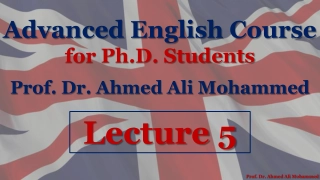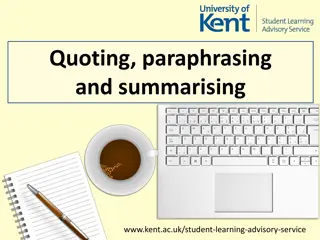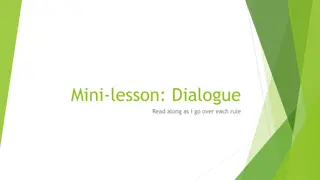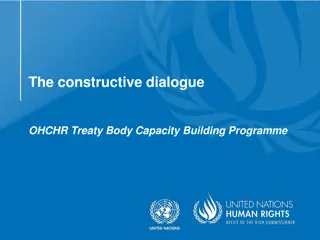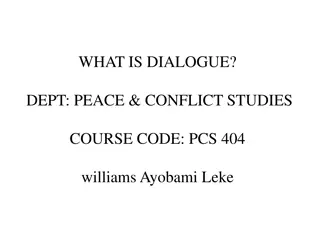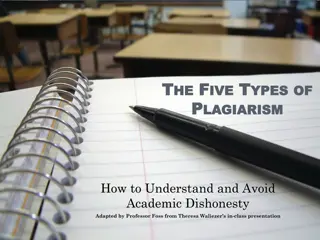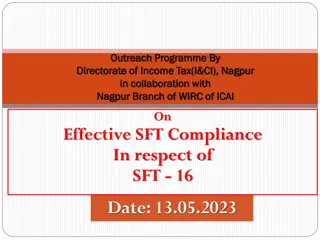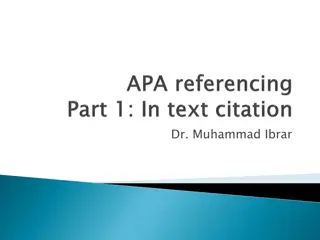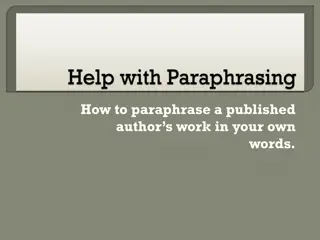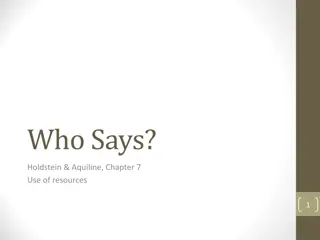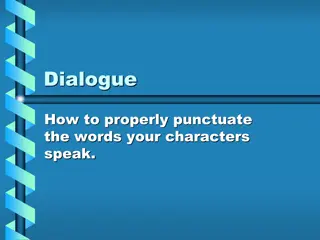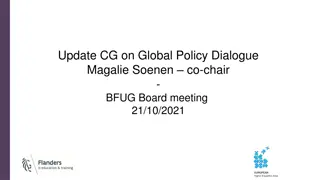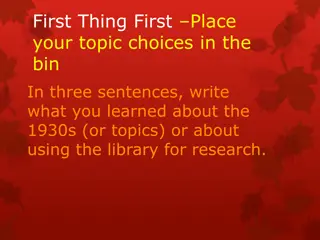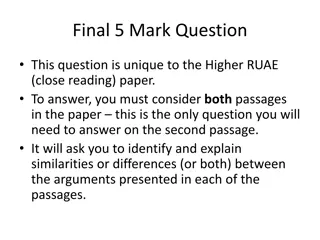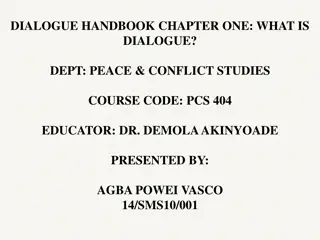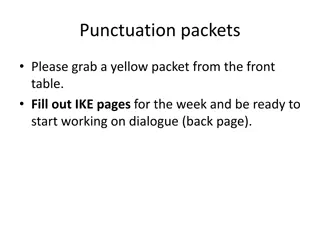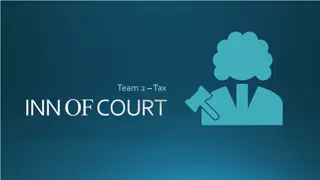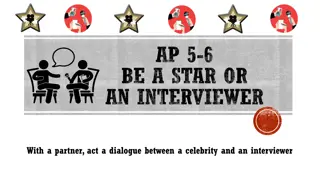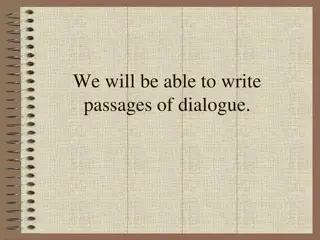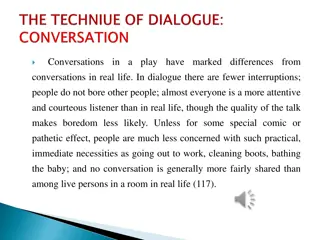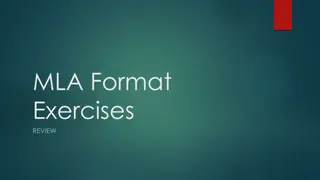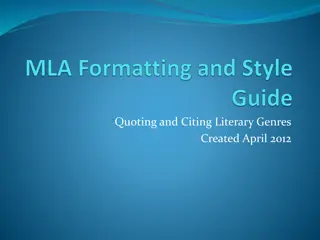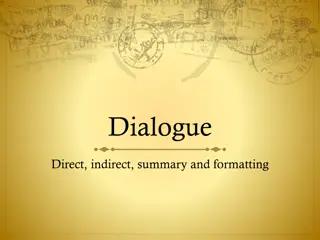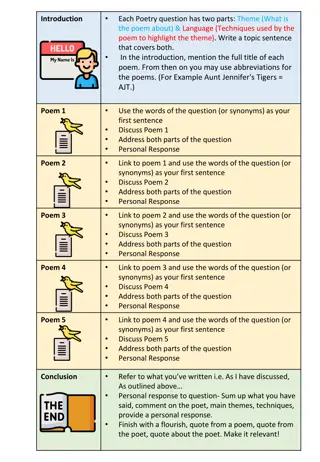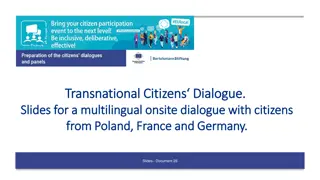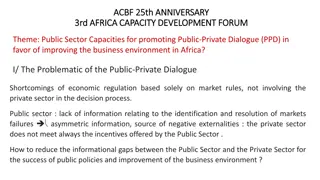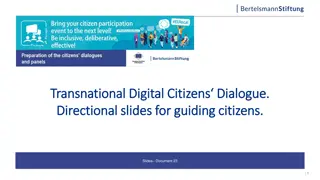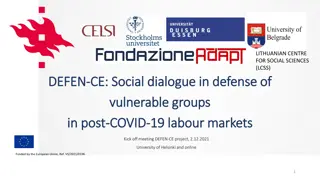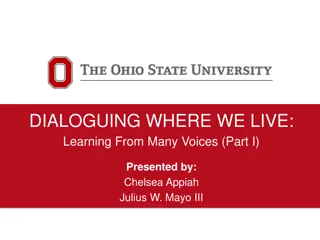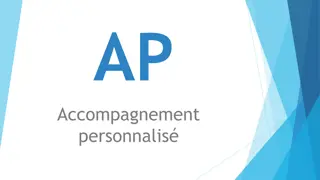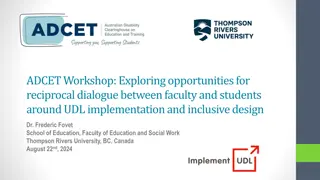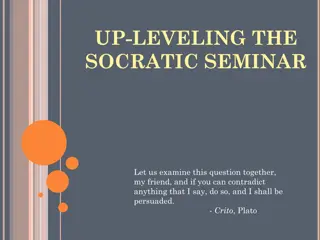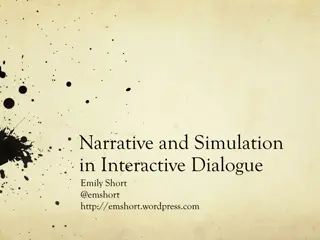Advanced English Course for Ph.D. Students
Prof. Dr. Ahmed Ali Mohammed's lecture on paraphrasing and quoting in academic writing. Learn strategies to develop paraphrasing skills and understand the purpose of paraphrasing in research.
0 views • 15 slides
Mastering Quoting, Paraphrasing, and Summarizing Skills in Academic Writing
Understanding the importance of quoting, paraphrasing, and summarizing in academic writing, this tutorial explains when and how to use each method effectively. Quoting involves repeating exact words for crucial definitions or evidence, paraphrasing focuses on using your own words to convey understan
0 views • 14 slides
Understanding Links in Textual Content
Learn how to identify and analyze links between ideas in a text by examining how specific sentences provide connections. Follow a structured approach of quoting, explaining, and analyzing words that link backwards and forwards to establish a clear understanding of the text's coherence.
2 views • 21 slides
Mastering Dialogue in Writing: Essential Rules and Examples
Learn the key rules of using dialogue in writing through examples and explanations. Discover when to use italics or quotation marks, how to handle punctuation and capitalization, when to introduce speakers, and how to add variety to dialogue tags. Get ready to enhance your writing with effective dia
0 views • 6 slides
Understanding the Constructive Dialogue in Human Rights Context
The constructive dialogue is a key component of the OHCHR Treaty Body Capacity Building Programme, assisting treaty bodies in comprehensively assessing the human rights situation of a state party. This process involves various stakeholders, including state delegations and treaty body members, in str
1 views • 9 slides
Understanding Dialogue in Peace and Conflict Studies Course (PCS 404)
In the field of Peace and Conflict Studies, dialogue plays a crucial role in resolving disputes and achieving mutual understanding. This article explores the definition of dialogue, its principles, views, and two types of discussions - destructive and constructive. By understanding the essence of di
0 views • 8 slides
Understanding and Avoiding Plagiarism: Types, Consequences, and Prevention
Understand the five types of plagiarism, from intentional to unintentional, and learn how to identify, avoid, and properly cite sources to prevent academic dishonesty. Explore techniques for paraphrasing, quoting, and documentation styles like MLA and APA to ensure academic integrity.
5 views • 12 slides
Compliance Obligations and PAN Requirements for Financial Transactions
This outreach program by the Directorate of Income Tax in Nagpur, in collaboration with the Nagpur Branch of WIRC of ICAI, focuses on effective compliance with Statement of Financial Transactions (SFT). It covers PAN compliance obligations, forms, and penalties for non-compliance related to specifie
0 views • 14 slides
Mastering Source Citation Techniques for Research and Assignments
Explore the essential elements of referencing styles, including in-text citations and reference lists. Learn how to credit sources properly, cite ideas and theories, and direct readers to full source details. Understand the rules for citing authors, quoting specific parts, and referencing multiple a
2 views • 12 slides
Effective Techniques for Paraphrasing Academic Work
Paraphrasing published author's work requires time, understanding, and persistence. Recognize the distinction between quoting and paraphrasing, emphasizing the importance of citations. Avoid excessive quoting in social sciences, preferring paraphrasing. Spend ample time reading and discussing ideas
0 views • 23 slides
Effective Use of Sources in Academic Writing
Utilizing resources effectively in academic writing involves proper use of summarizing, paraphrasing, quoting, and selecting among these techniques based on importance. It is essential to avoid patchwriting, maintain clarity, and ensure the original work's integrity while crafting your argument.
0 views • 6 slides
Mastering Dialogue Punctuation for Realistic Writing
Learn how to properly punctuate dialogue to make your characters' conversations engaging and clear. Understand the rules of punctuating dialogue, including using quotation marks, speaker tags, end marks, and handling interruptions. Enhance your writing by mastering the art of punctuating dialogue re
0 views • 13 slides
Global Policy Dialogue: Enhancing Cooperation and Knowledge Sharing
A comprehensive overview of the set-up and outcomes of the Global Policy Dialogue's kick-off meeting, including the establishment of sub-groups focusing on macro-regions and the development of a work plan for facilitating cooperation and mutual understanding. The umbrella project aims to enhance int
0 views • 6 slides
Dialogue on Appreciation at an Art Exhibition
Two friends, Sakil and Rina, visit an art gallery and admire the paintings together. They engage in a dialogue appreciating the beauty, creativity, and talent showcased in the various artworks. The conversation reflects their admiration and respect for the artists' work, culminating in a heartfelt a
0 views • 8 slides
Understanding Plagiarism and Proper Citation Techniques
Plagiarism is a serious academic offense that involves using someone else's work without proper acknowledgment. This includes copying text from the internet without citation or failing to use quotation marks when quoting an author. It is important to cite sources correctly, even when summarizing or
0 views • 38 slides
Insights into Social Economy and Social Dialogue Research Outcomes
Research outcomes from the Mesmer+ project at HIVA KU Leuven reveal misalignments in social dialogue inclusiveness, challenges faced by social economy entities, and the role of employers in the social economy. Recommendations include enhancing the role of social economy employers and promoting inclu
1 views • 7 slides
Analyzing Agreement and Disagreement in High School RUAE Passages
This task involves identifying and explaining similarities or differences between arguments presented in two passages for the Higher RUAE (close reading) paper. The focus is on recognizing key areas of agreement or disagreement and providing supporting evidence from each passage to earn marks. Tips
1 views • 17 slides
Understanding the Essence of Dialogue in Peace and Conflict Studies
Dialogue, derived from the Greek term "dialogos," encompasses more than mere conversation. It is a unique form of communication where participants actively seek mutual understanding and deeper insights. Key principles include trust, openness, honesty, and equality. Understanding the nature of dialog
0 views • 11 slides
Enhancing Dialogue Skills Through Mentorship and Practice
Explore the world of dialogue with engaging activities such as filling out IKE pages, practicing conversation between characters, and using various dialogue tags. Dive into character development, emotion, and plot depth with dialogue checklist and interactive practices. Get inspired by well-known li
0 views • 7 slides
Quoting Ralph Waldo Emerson: A Chief Justice's Perspective on Tax Court Consistency
The Chief Justice of Canada's Tax Court referenced Ralph Waldo Emerson's famous quote in a judgment, highlighting the significance of avoiding foolish consistency. This insight offers a unique viewpoint in the world of tax jurisdiction, emphasizing the value of voluntary and self-assessed approaches
0 views • 50 slides
Celebrity Interview Dialogue Practice Activity
Practice a dialogue between a celebrity and an interviewer with a partner. Choose a celebrity, fill in details, write an interview, and role-play in front of the class. Follow steps for greetings, introductions, and questions about personal details and interests. Sample dialogue featuring Angelina J
0 views • 4 slides
Enhancing Dialogue Writing Skills for Engaging Narratives
Explore the importance of dialogue in writing and learn how to enrich dialogue passages with narrative descriptions. Dive into the narrative nuances of characters through dialogue interactions, adding depth and vitality to your storytelling. Practice revising punctuation in dialogue and craft your o
1 views • 10 slides
Understanding Paraphrasing, Summarizing, and Direct Quoting for MLA Style
Exploring the differences among paraphrasing, summarizing, and direct quoting in MLA style. Paraphrasing involves rewriting in one's words, summarizing captures main ideas concisely, and direct quoting requires identical replication. These methods add credibility, support arguments, and serve variou
0 views • 6 slides
Insights into Stage Dialogue and Craftsmanship in Playwriting
Stage dialogue differs from real-life conversations, with a focus on attentive and courteous listening. Stage conventions like asides and set speeches serve to convey inner thoughts and showcase actors' skills. Crafting effective dialogue in plays involves balancing information and aesthetic appeal,
0 views • 5 slides
MLA Format Exercises Review
This document provides exercises on in-text citations, works cited entries, quoting, the use of brackets, slashes, and ellipsis in MLA format. It includes examples and practice exercises for each component to help improve understanding and application of MLA citation rules.
0 views • 7 slides
Modern Language Association (MLA) Guidelines for Quoting and Citing Literary Genres
Learn how to properly quote and cite literary genres following the MLA Handbook for Writers of Research Papers. Explore guidelines for citing authors in parenthetical citations and incorporating prose quotations into your text, including handling question marks and block quotes.
0 views • 16 slides
Mastering Dialogue: Direct, Indirect, Summary & Formatting
Good dialogue should be believable and distilled, conveying the essence of conversations without filler. Direct quotations are used for critical moments, while indirect speech allows characters to speak freely without quoting verbatim. Dialogue can set the mood, advance the action, and reveal charac
0 views • 10 slides
Grammar on the Go! PowerEd Express Unit 3-5 Sentence Corrections & Punctuation Tips
Improve your grammar skills with this lesson on correcting sentences and using proper punctuation. Learn about sentence types, capitalization, quoting dialogue, and more. Enhance your writing and communication abilities with insightful tips and examples.
0 views • 11 slides
Crafting Literary Analyses: Study of Poetry Themes and Language Techniques
Explore an insightful approach to analyzing poetry themes and language techniques through a structured paragraph template. Delve into five poems, dissect their themes and techniques, and craft personal responses to each piece. Uncover the beauty of poetry with a systematic examination that includes
0 views • 4 slides
Transnational Citizens Dialogue Slides: Multilingual Onsite Event from Poland, France, and Germany
Explore the transnational citizens' dialogue slides designed for a multilingual onsite event involving participants from Poland, France, and Germany. The presentation covers welcome sessions, program details, topics of discussion, and capturing citizens' opinions on Europe. Engage in a comprehensive
0 views • 16 slides
Enhancing Public-Private Dialogue for Development in Africa
Addressing the shortcomings in public-private dialogue can lead to improved business environments in Africa. The challenges include information gaps, lack of involvement of the private sector in decision-making, and issues with economic regulation. Successful examples like the Cameroon Business Foru
0 views • 5 slides
Understanding Accommodationism in Religious Dialogue
Exploring the concept of accommodationism in religious discourse, this content delves into topics covered at a summit and provides insights on the benefits of dialogue over confrontation. Operational definitions, a case for accommodation/dialogue, and the importance of understanding diverse religiou
0 views • 15 slides
Transnational Digital Citizens Dialogue Directional Slides
This document contains directional slides for guiding citizens in the Transnational Digital Citizens Dialogue. It includes technical instructions, the dialogue process, chat functions, and welcome messages in multiple languages. Important symbols in Zoom, camera and microphone usage instructions, la
0 views • 13 slides
Social Dialogue in Defense of Vulnerable Groups in Post-COVID-19 Labour Markets
The Lithuanian Centre for Social Sciences (LCSS) is hosting the DEFEN-CE project kickoff meeting at the University of Helsinki, focusing on social dialogue in defense of vulnerable groups in post-COVID-19 labor markets. The project aims to explore the role of social dialogue in addressing employment
0 views • 33 slides
Exploring Dialogue and Community Engagement in "Dialoguing Where We Live" Senior Staff Training
This event titled "Dialoguing Where We Live: Learning From Many Voices" provides insights on fostering dialogue, amplifying voices, and promoting community engagement. The training agenda includes key facilitation concepts, interactive activities like Kahoot, and discussions on important concepts su
0 views • 38 slides
Classroom Role-play Activity: Teacher and Pupils Dialogue
Engage students in a role-playing activity where they act out a classroom dialogue between a teacher and pupils. The activity involves forming groups, choosing roles, writing dialogue, and acting out the scene in front of the class. The teacher's and pupils' roles are defined, with specific instruct
0 views • 4 slides
Reciprocal Dialogue in UDL Implementation: Faculty-Student Perspectives
Exploring opportunities for dialogue between faculty and students on Universal Design for Learning (UDL) at Thompson Rivers University in Canada. Dr. Frederic Fovet leads discussions on UDL implementation, inclusive design, and student agency. Objectives include examining UDL developments in higher
0 views • 29 slides
Enhancing Socratic Seminars through Collaborative Dialogue
Socratic Seminars promote deep exploration of texts through collaborative dialogue, fostering curiosity, inquiry, problem-solving, and cognitive flexibility. The goal is not to provide correct interpretations but to construct knowledge collectively. Dialogue, not debate, is emphasized, encouraging o
0 views • 14 slides
Streamlining Freight Quoting and Management with GreenScreens Platform
Revolutionize your freight operations with GreenScreens, a powerful platform offering features like lane data analysis, quoting tools, customer rate sending, and batch quoting capabilities. Enhance efficiency, optimize rates, and win more business seamlessly in the competitive logistics landscape.
0 views • 8 slides
Exploring Narrative and Simulation in Interactive Dialogue
In this discussion, Emily Short delves into the convergence of narrative and simulation within interactive dialogue, emphasizing goals like explorability, expressiveness, pacing, and character agency. The design focuses on player freedom in dialogue interactions while maintaining a compelling narrat
0 views • 51 slides
